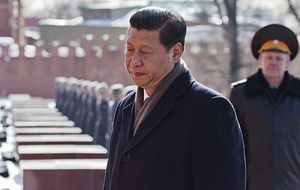Chinese leaders held their second work conference on foreign policy in 8 years — a rare occurrence by any measure (the previous one was held in 2006). What should one make of this important conference and Chinese President Xi Jinping’s speech therein? Different analysts (here, here, and here) have offered different interpretations, with most focusing on how to link Xi’s speech to China’s recent foreign policy behaviors. Such interpretations have merits, though they tend to miss the big picture in Xi’s speech, which is about China’s new grand strategy in the coming decades.
As Premier Li Keqiang said during the meeting, Xi’s speech has important guiding meaning for China’s foreign policy both presently and in the coming years. What this means is that the speech is meant to establish the guiding principles of Chinese foreign policy, very much like Deng Xiaoping’s “keeping a low profile” guiding principle in the early 1990s. The major difference, of course, is that Xi seems to have shifted away from the “keeping a low profile” principle, though government rhetoric would suggest otherwise. What has been emphasized is the need to be active and creative in foreign affairs because without this it would be impossible to realize the Chinese dream and the great national rejuvenation which Xi has emphasized.
One new and important message from the speech is that now there is a clear strategic goal for China’s foreign policy. Unlike the U.S., China does not have the tradition of making its strategic goals known to the outside world. It used to be case that China’s foreign policy was primarily meant to serve China’s economic development, which was the most important goal above all else. Now things have changed. The new goals are the “two centenary goals” which are more specific and ambitious than just economic development. The contrast is particularly salient if one compares Xi’s speech this time with the 2006 speech on foreign affairs by Hu Jintao in which no strategic goal was mentioned.
Another interesting message is that Chinese leaders view their foreign policy after 2012 as a major success thus refuting the view that Xi now takes a more careful approach or a conciliatory tone. If the dominant interpretation by Western analysts were that China will back down from some of the disputes with other countries in Asia, then this would be a serious mistake on the part of those analysts. Of course, China being firm does not mean that it will act recklessly and increase international tensions on purpose; it simply means that Xi and his colleagues will not bow down to foreign pressures in defending China’s national interests. It also means that China’s so-called assertive foreign policy behavior will continue rather than stop, as some Western analysts have hoped.
Also important is how Chinese leaders assess the international environment in the future. Regarding the long-term trends of world politics, Chinese leaders have made five conclusions. First, there is the trend toward a multipolar world. Second, there is the trend of globalization. Third, there is the trend of peace and development. Fourth, there is the trend of reform in the international system. And lastly, there is the trend of growing prosperity in the Asia-Pacific region. Because of these five long-term trends, Chinese leaders believe that China is still in a period of strategic opportunity, which will benefit China’s overall development.
Overall, Xi’s speech shows lots of confidence on the part of Chinese leaders. They believe that China is now entering a critical period of great national rejuvenation and as such the country needs to manage its own diplomacy with Chinese style and Chinese characteristics. What this means for the U.S. and its allies in Asia is that they will have to deal with a China that is more powerful, more ambitious, and more confident. Any underestimation of the determination and will on the part of Chinese leaders will lead to serious perception gaps and even potential conflict. For this reason, it is important for Western analysts to examine this speech carefully, leaving pre-existing biases and wishful thinking behind.

































